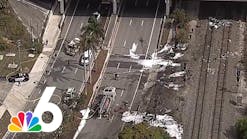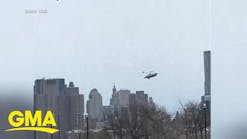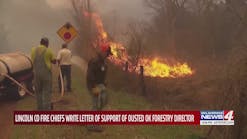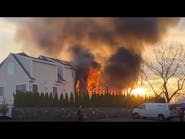Detroit's newly created emergency services cost-recovery ordinance could reap millions of dollars for the city and spur utilities to respond more quickly to downed power lines, supporters say.
The ordinance, which passed 7-0 on Tuesday, went into immediate effect, said Kirsten Ussery, spokeswoman for City Council President Charles Pugh.
"The City Council finds that the continuing increase in the cost of providing adequate public safety services by the City of Detroit has created an urgent need to authorize the City to seek reimbursement for the actual and necessary cost of these services," the ordinance reads.
Edith Lee Payne, a Detroit resident and community activist, said, "I believe it's a major move forward for the City of Detroit financially. Certainly, anything that addresses budget deficits and costs is what is needed to bridge that financial gap."
Payne said that based on what other cities have billed, Detroit could collect millions of dollars from fire and police runs that involve vehicle extractions, house fires, downed power lines and the like.
City Councilwoman JoAnn Watson proposed the ordinance in October 2010 after a windstorm on Sept. 7, 2010. About 70 homes were destroyed or damaged when winds as high as 50 m.p.h. knocked down power lines and fanned fires all over the city.
Firefighters complained that they were forced to guard downed power wires for hours as many homes burned. Watson wanted the city to be able to charge DTE Energy for the time firefighters spent guarding downed lines while waiting for utility personnel.
Under the ordinance, claims will be filed with utilities for costs of watching dangerous power lines. The city will bill drivers for vehicle accidents and property owners for fires and other emergencies that require city personnel response.
Detroit's ordinance is similar to that of other communities in metro Detroit, such as Ferndale and Bruce Township.
The ordinance is meant to spur DTE to respond more quickly to reports of downed power lines -- or pay for the time firefighters spend at those scenes.
"This cost-recovery ordinance will allow a team of experts from the Police Department and the Fire Department to identify costs that the City may have borne with respect to downed wires and the appropriate assignment of reimbursement fees to utilities when appropriate," Watson said in an e-mail to the Free Press.
Pugh, through Ussery, declined an interview to discuss the ordinance.
"We're disappointed, not only for ourselves as a major taxpayer in the city, but also for residents, who could now also be charged by the city for causing police and fire personnel to respond to their residence if a tree in their yard, or their vehicle, brings down a power line," said DTE Energy spokesman Scott Simons in an e-mail to the Free Press on Thursday.
But Daniel McNamara, president of the Detroit Firefighters Association, who pushed for the ordinance, said that it's good for firefighters.
"When wires fall down, we can have fire trucks sitting there from 15 minutes to a day and a half," McNamara said.
He said that firefighters will be able to recover costs -- possibly from insurance companies -- for time and equipment used at to clean up hazardous material spills or to extricate people from wrecks on roadways. "We will be reimbursed for things that we used to mitigate hazards," he said. "It's not taking advantage of anyone. It's a normal course of business."
The council's Public Health and Safety Committee will consider amendments to the ordinance as needed, such as setting basic fees.
Copyright 2012 - Detroit Free Press
McClatchy-Tribune News Service





